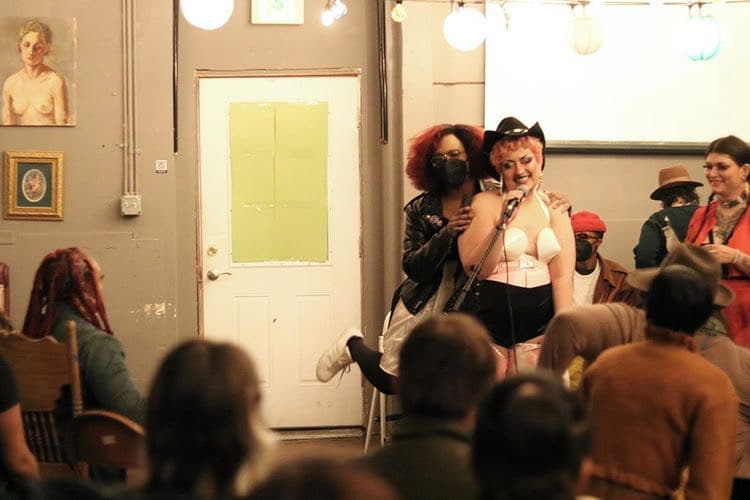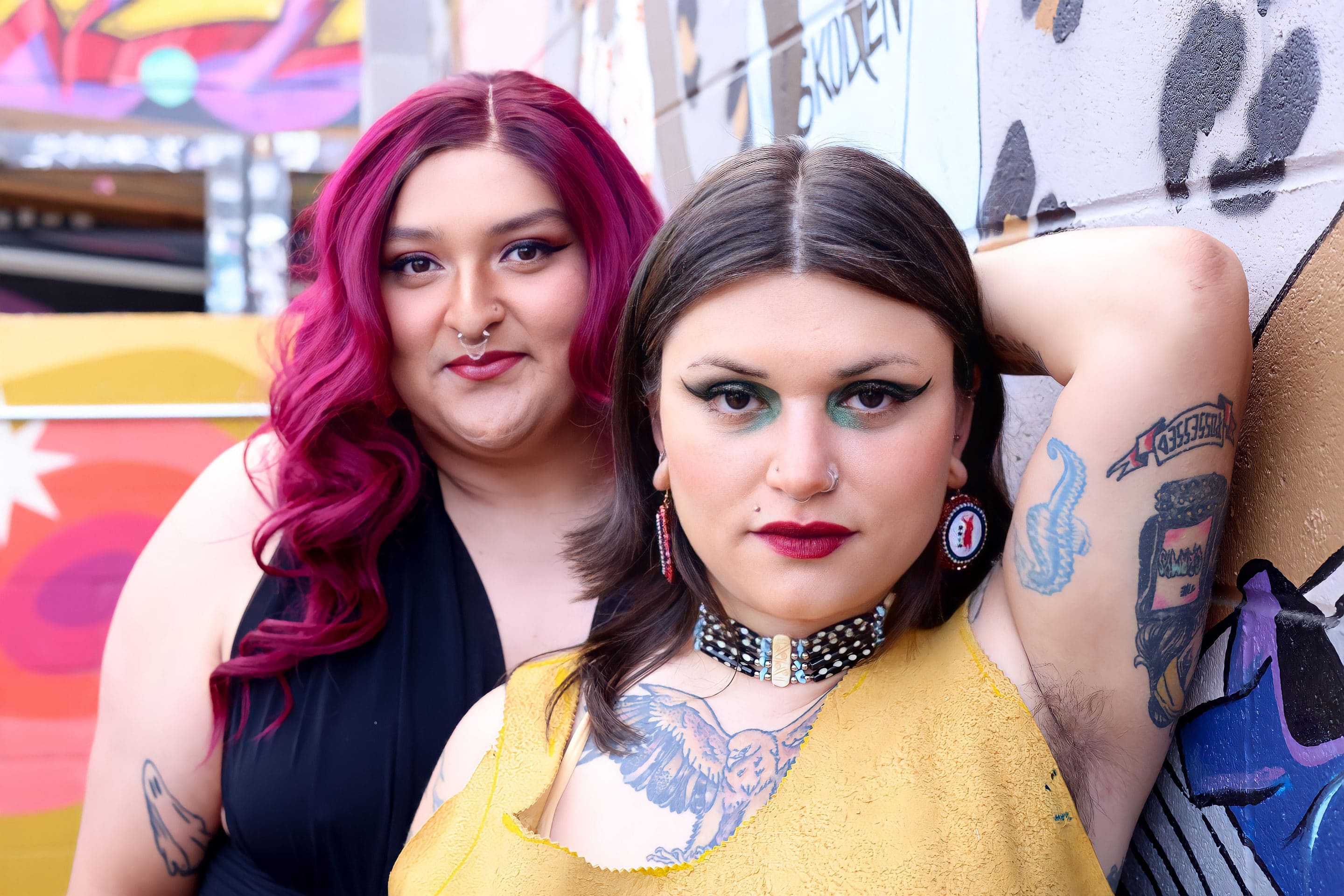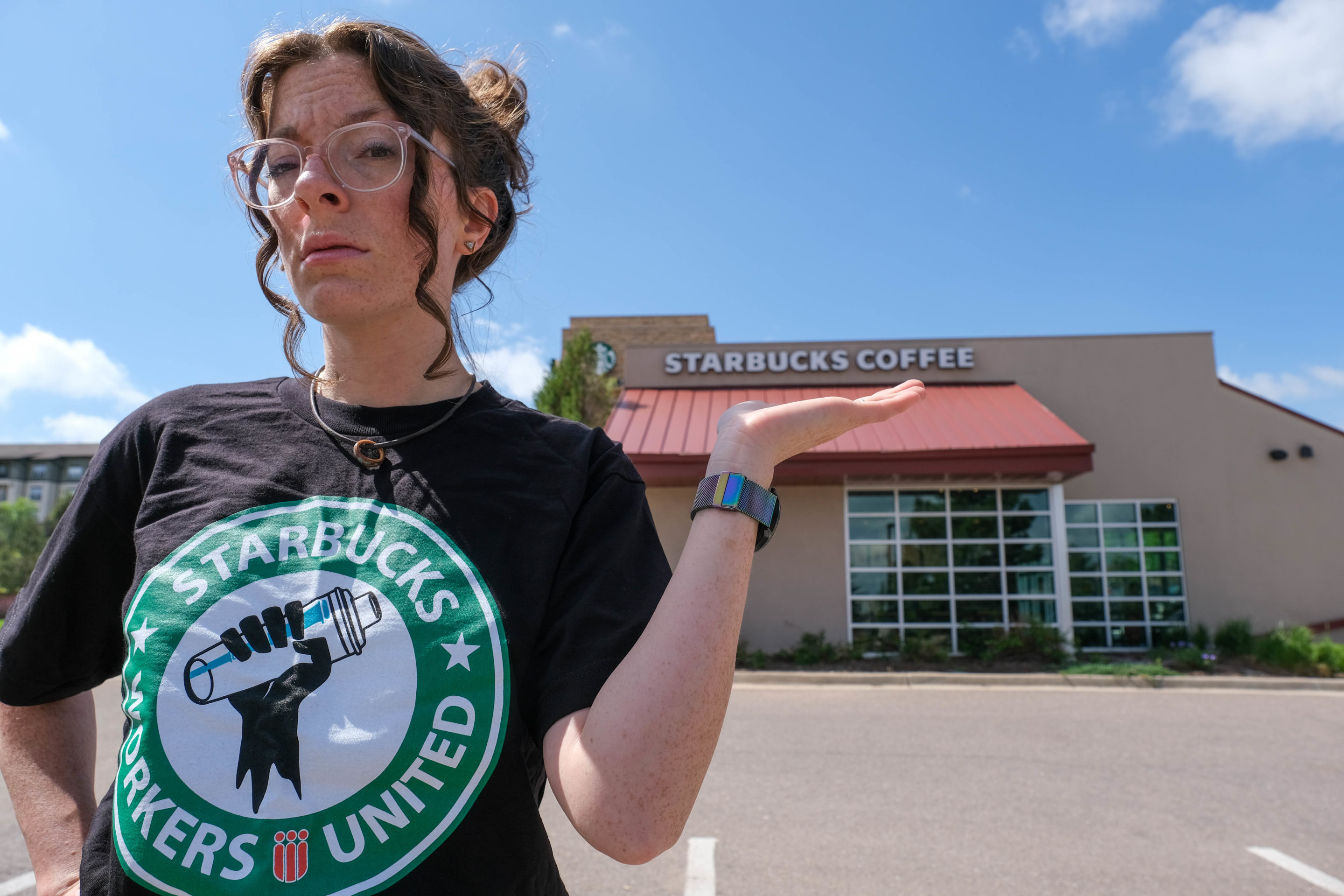//Rad-De-Colonial founders Major Moisture and Siren Sixxkiller pose in front of a mural “Still Here” by Danielle Seewalker in the RiNo Art District in Five Points on May 3. Along with Piss E. Sissy who isn’t pictured, Moisture and Sixxkiller formed Rad-De-Colonial to showcase BIPOC burlesque and drag performers. Photo by Sara Martin | [email protected]
As the city and its LGBTQ+ community continue to grow, it’s hard to ignore Denver’s bustling drag and queer performance scenes. However, community members have called out the Denver performance scene for its inaccurate representation of the LGBTQ+ community and the diversity of the city’s performers, namely that many shows and showrunners fail to genuinely uplift Black and Brown artists.
Major Moisture, Piss E. Sissy and Siren Sixxkiller formed Rad-De-Colonial with this conversation in mind. The quarterly, sex-positive variety show centers and celebrates people of color, “decolonizing the scene with radical love.” Rad-De-Colonial showcases drag and burlesque performers and other variety acts of color looking for a platform.
The three co-producers said the concept began as highly DIY, emerging from their shared experience of witnessing a lack of diversity in Denver performance spaces.
“I know, often, we felt like the token performer, especially being queer and trans people, that we wanted to create an alternative space centering around decolonizing the performance scene here,” Piss E. said. “That’s not specific to just folks that identify as Native; it’s Black and Brown people who have been affected by colonialism.”
What started as a conversation among friends morphed into in-person planning meetings, where the trio began making merchandise to fundraise. They said the conversations first began in late 2021, though they started making moves in January 2022.
By the end of February, Rad-De-Colonial was already holding its first show, which was immediately met with a “warm welcome” by the community, Piss E. said, exemplifying that “a lot of other people felt like creating more BIPOC-specific spaces was very much needed.”
Siren said the first show made it clear that they were creating space with the community, not separate from it. She referenced the end of the show, after the curtain call and final musical act, everyone in the audience joined the cast on the dance floor.
“It just felt very warm, not separated,” Siren said. “It was like we were all together, and that felt really good. I want that feeling, that warm feeling, every time.”
Major said it was a mutual feeling among attendees as well.
“I’ve had a lot of people come up to me and ask, ‘What? This is real? This is an actual thing that’s going on?’” they said. “I’ve explained it to them and everything, but it’s telling that it takes one event to have people questioning all of the events around Denver and why they’re not including people that look like them, like me, like everyone, you know?”
Piss E. nodded to Melanated Menagerie, a Denver all-BIPOC cabaret production, as another group centering Black and Brown artists to help create a more inclusive performance scene, “but I don’t think that there should only be one,” they said. Rather, they believe there should be multiple avenues for performers of color to be able to be showcased.
It mirrors a similar principle behind the rejection of tokenism: Performers of color want a collection of options and venues to see themselves represented in the scene, not just a single show.
Piss E. referenced feeling like a token performer in the past because there were too many white performers and white producers felt an obligation to include people of color.

“I don’t think that white producers are doing enough,” Piss E. said. “I’ve been noticing, as social justice language becomes more commonplace, they’re just seeking out Black and Brown performers because that looks good, or they’re being called racist. It’s not really well-intentioned.”
Major said they’ve had conversations with several show producers with mainly white performers, though they often stop once they’ve added a single non-white performer without proactively trying to continue diversifying their casts.
“As Piss E. said, there’s Melanated Menagerie; there’s a whole list of people on Instagram that you can contact,” Major said. “They’re tagged. There’s a lot more that all of them can do, rather than booking the same seven people just because they know how they perform.”
Siren said part of the solution lies in Rad-De-Colonial’s own origins: People of color creating these spaces for themselves. She said that Rad-De-Colonial will hopefully show others in the community that they can create similar spaces and expand opportunities for Denver performers of color.
“There’s room for even more shows, and hopefully even more pop up,” Siren said. “Or, people can be inspired and see themselves represented on stage, like, ‘Oh, I could do that. I want to do that.’”
Major added, as a person who is mostly white-passing, that they never acknowledged themself as a person of color growing up, but Rad-De-Colonial helped them to embrace that part of their identity.
“I have a community that backs me up, and I can also contribute to it,” Major said. “It has been really awesome to figure out and definitely a new experience for me.”
With the quarterly show, the intention will be consistent, but the co-producers are looking forward to curating something a little different each time. The next Rad-De-Colonial show’s theme is “Slutty Springtime Spectacular,” set for May 21 at Universe.
The May show will feature a stripper pole for a wide array of performances, including drag, burlesque and variety; along with harm-reduction supplies, like fentanyl test strips and Narcan, and safer sex supplies.
The co-producers are looking ahead with an understanding that the dynamic will soon shift: Piss E. lives in San Francisco, and Major is gearing up to move to Austin. The trio is thinking of bringing in elements from each community and potentially making Rad-De-Colonial a traveling show.
Whatever the future holds, each co-producer voiced their gratitude for the community response and their excitement for Rad-De-Colonial’s future. Piss E. said that the magic of the show extends beyond the producers, evident in each artist, each vendor and each performance space.
“All the folks really impact us, or at least I feel like they impact us much more than we’re doing producing,” Piss E. said. “So, I’m excited for each show to see what unique performances each will bring.”
For tickets to their next show, visit the event’s official Eventbrite page.
Enjoyed this story? Help us keep the lights on! Supporting local press ensures the stories you want to read keep coming, become a member for free today! Click here.





0 Comments